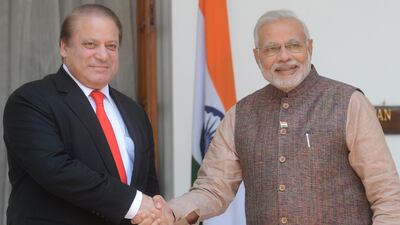I am responding to Zia Hashmi's letter Indian leader sets a good example (May 28), where he has expressed his annoyance at the UAE media going overboard on coverage of news from India.
When he argues that the UAE is a cosmopolitan country, he overlooks the fact that immigrants from the Indian subcontinent – India, Bangladesh and Sri Lanka – form more than 60 per cent of the population of the UAE. For centuries, long before the discovery of oil, India and the Gulf countries shared strong trade relations.
Secondly, the recent events in India are nothing short of a historic political revolution in a perfectly democratic way. It will have far reaching political, social and economic consequences on Asian countries. The UAE media has been rightly highlighting these developments in India.
CS Pathak, India
The move by Narendra Modi to invite Pakistan's prime minister, Nawaz Sharif, has generated criticism both in India and Pakistan (Can Modi reset India's ties with Pakistan? May 24). However, instead of criticising, political parties must come together to see how they can help ease the tension between the two countries.
It’s the Indian media that often escalates the tensions and unwarranted criticism. Better relations will improve the economy of both countries and greatly benefit the people of both countries.
Mr Modi’s gesture has raised hopes. As India enters a new era, the people of India look forward to a peaceful coexistence.
Ramachandran Nair, Oman
Children like little Kenzy are an inspiration to all of us (Small steps that were a giant leap for UAE genetic disorder girl, May 20). They are special because they have the determination and courage to excel in life despite their disabilities, a quality many able-bodied people do not possess. However, it is sad that we as a society fail to help these children to lead a normal life. They are not sick, nor do they need our sympathy. All they need is support and motivation from us and our acceptance. It is upsetting that most private schools turn away from their responsibilities towards special-needs children.
These children are as capable as anybody else of their age and deserve every opportunity to make progress in life.
Fatima Suhail, Sharjah
I am writing in reference to the article 250 Emiratis take UK Citizenship in 22 Years (May 22). I cannot believe that an academic could state that unless it was for marriage, there would be no other reason to take up residence in the UK.
I, personally, can think of a number of reasons why people from the Middle East would do so, other than just for marriage. The climate in this region is harsh for seven months of the year and many people cannot cope with the extreme temperatures for health reasons.
The UK is renowned for its equal opportunities in terms of employment. The higher education system recognises that people are equipped with different talents and offers certificates, diplomas, associate degrees, degrees, MAs and PhDs in a multitude of disciplines to suit the interests and skills of its cosmopolitan population.
Qualifications are not limited to jobs of prestige only, but recognise that if a country is to be operated by its own citizens instead of outside labour, then its people need to be equipped with a variety of different skills to achieve this aim. In fact, in the UK, people earn more money as a labourer, construction worker, plumber, electrician and builder than in most office jobs as these people are integral to the smooth running of the infrastructure of the country.
Finally, while property prices are not cheap in the more upmarket areas, generally the cost of everyday living is.
Name withheld by request
Are taxi and bus drivers really the worst (Bus accident blamed on human and technical faults, May 26)? I don't think so. The worst ones are those who think themselves superior to other drivers, threatening with bigger and faster cars. They act like cowboys on UAE roads.
J Lee, Dubai
I have found female taxi drivers to be more reckless than men. They recklessly overtake and change lanes, which seems to be the norm with all but one that I’ve had the misfortune to travel with in the past few months.
Bint Muhammad, Abu Dhabi
I took a taxi to work everyday for two years and I can count the occasions when I actually felt unsafe. If they drove too fast, I asked them to slow down. I usually find others driving selfishly and in a thoughtless manner.
Umm-Zaynab Bouyakasha, Abu Dhabi
Accidents happen when drivers work extraordinarily long hours. I think they hold up well against the immense fatigue they bear. I respect them.
Samar Boulos, US

